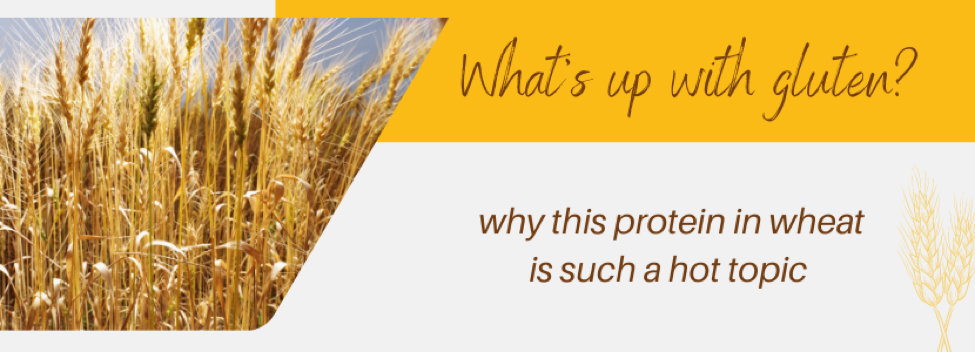
Have you noticed the attention gluten has gotten recently? It’s hard not to when we know people who have cut it out of their diet, scan over gluten-free items on a menu, and see labels blaring the fact that the ingredient isn’t found in its product.
It’s a hot topic and there’s a good reason why.
It is estimated that 18-20 million people in the US have a sensitivity to gluten – this is in addition to the approximately 3 million who suffer from the gluten allergy disease – celiac.
So what’s going on and why are we hearing about it more now than ever before?
While there can be a variety of reasons (such as an increase in research), some of it may be due to the evolution of commercial farming and how wheat in our diet has changed.
Gluten is a protein found in wheat, rye, and barley.
Commonly consumed foods with gluten include:
- bread
- pasta
- cereals
- pastries
- crackers, cookies
- salad dressings
- processed meats
- soy sauce
- beer
making gluten a popular staple in the American diet.
And while we’ve eaten gluten since ancient times, grains may be changing in our current world.
Due to industrialization and some modern farming practices, many grains aren’t the same as they once were. Milling processes have stripped nutrients (such as with white flour) and the modification of grains for bigger yields has created resistant disease crops that may have detrimental effects on health (like the use of glyphosate that may contribute to endocrine disruption, autism, and cancer).
Is gluten bad then?
Not necessarily. It’s simply a natural protein found in nature.
However, some people have immune reactions to gluten and can suffer from:
- celiac disease (an allergy to gluten)
- non-celiac gluten sensitivity (an intolerance to gluten without the presence of allergy or celiac disease)
In addition, a diet high in these grains can disrupt the microbiome because yeast can feed on these foods leading to candida overgrowth.
Common symptoms of an immune reaction to gluten are:
- digestive disorders
- constipation
- diarrhea
- gas, bloating
- nausea
- trouble gaining weight
- skin issues
- fatigue
- behavioral issues
- mood imbalance
and can happen in both kids and adults.
What can be done about it?
For serious issues such as celiac disease, antibody and genetic testing as well as pharmaceutical treatment may be necessary.
For non-celiac gluten intolerance, food sensitivity testing may be beneficial and is available at the CNMA office.
In addition to testing, an elimination diet can be performed. To do this, remove all gluten from your diet for at least 3 weeks while monitoring any changes. If symptoms improve, a gluten sensitivity may be at play.
Is it okay to eat gluten if there isn’t an allergy or sensitivity present?
If there is no reaction to consuming gluten, there is typically not much concern. Eating organic wheat, rye, and barley in less processed foods are best.
Gluten is a popular topic these days and due to changes in farming and food production it may not be going away anytime soon. Awareness of what symptoms a gluten allergy and/or sensitivity can present and how to discover if that is the issue can be key in alleviating your discomfort.
Do you think you or your child may have a gluten allergy or sensitivity? Dr. Graves may be able to help.
For testing and naturopathic symptom management, please call us at (303) 688-6698 or click here to schedule a free 15 minute phone consultation with Dr. Graves to talk more.
The CNMA office provides naturopathic care, testing, massage, and holistic counseling to those in Castle Rock, Castle Pines, Highlands Ranch, Lone Tree, Centennial, Parker, Larkspur, Monument, Colorado Springs, and the greater Denver metro area. For those outside of these areas, virtual appointments are available.
REFERENCES:
https://www.beyondceliac.org/celiac-disease/non-celiac-gluten-sensitivity/
https://www.verywellhealth.com/how-many-people-have-gluten-sensitivity-562965
https://www.medicalnewstoday.com/articles/gluten-foods
https://www.ncbi.nlm.nih.gov/pmc/articles/PMC3945755/
https://pubmed.ncbi.nlm.nih.gov/32203845/
https://www.mayoclinic.org/diseases-conditions/celiac-disease/diagnosis-treatment/drc-20352225

Leave a Reply